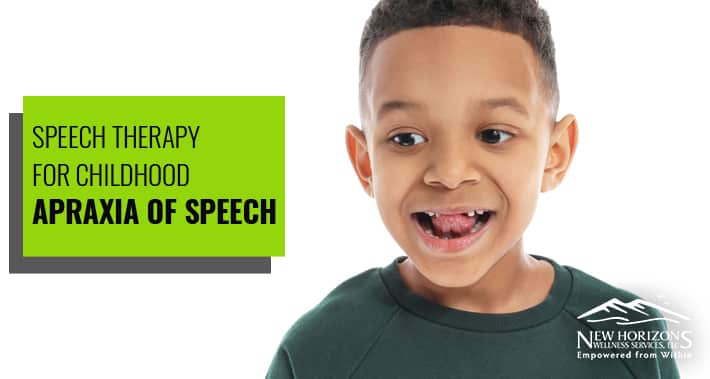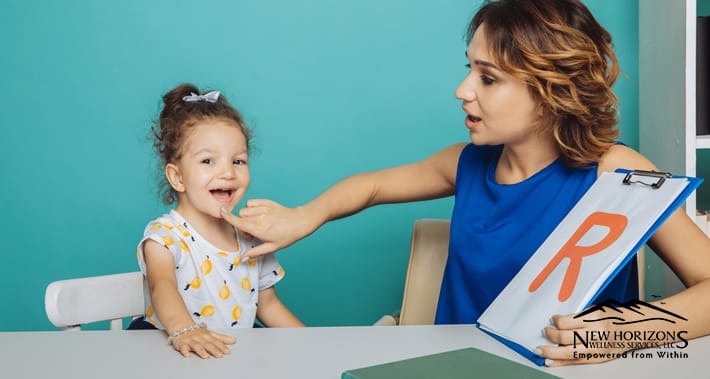
Childhood apraxia of speech is a speech disorder that occurs when your child’s brain struggles to coordinate speech movements.
It’s important to note that it’s not a muscle weakness.
Your child’s brain has to learn how to send the correct signals to direct their lips, jaw, and tongue during speech.
This is required in order to create accurate sounds and words.
Speech therapy can be a highly effective solution for this disorder.
Your therapist will break down the correct way to say words, syllables, and phrases so that your child can improve.
New Horizons Wellness Services offers many great speech therapists for kids that can tailor their work to your child for optimal results.
Now, let’s dive in.
What Is Childhood Apraxia Of Speech?
Childhood apraxia of speech is a rare speech disorder where your child has difficulty making accurate movements while speaking.
Typically, they know exactly what they want to say, but their brain struggles to send the signals to move their mouth and related speech muscles.
Their muscles don’t perform normally because their brain is working harder to direct and coordinate speech movements.
This is not a muscle weakness, but rather a coordination challenge.
Causes Of Childhood Apraxia Of Speech
There are many possible causes for childhood apraxia of speech.
As a result, it is often the case that a specific cause can’t be determined.
Sometimes, this speech disorder can be the result of a brain condition or injury such as a stroke, infection, or traumatic brain injury.
Childhood apraxia of speech can also manifest as a symptom of a genetic disorder or metabolic condition.
While it can also be referred to as a developmental apraxia, children with this disorder don’t necessarily grow out of it.
Speech therapy is required to maximize their development.
Speech Therapy For Childhood Apraxia Of Speech
The goal with childhood apraxia of speech is to diagnose it early and start speech therapy in order to minimize the risk of long-term persistence.
Once a speech therapist confirms that childhood apraxia of speech is present, they will create a program designed to teach your child how to plan the movements needed to say correct sounds, and how to make those movements correctly.
Now, let’s see what this process looks like in more detail.

1. Testing For Childhood Apraxia Of Speech
If you notice your child has any persistent speech problems, you should have them evaluated by a speech therapist.
Your speech therapist will test your child in order to evaluate them.
To do this, they will look at your child’s oral motor skills, speech melody (intonation), and how they say different words in order to test for childhood apraxia of speech.
This includes checking how well your child says speech sounds alone, as well as combined in syllables or words.
2. Testing For Other Conditions
While testing for childhood apraxia of speech, your speech therapist will test your child for other conditions too.
This is because speech sound disorders have overlapping symptoms with childhood apraxia of speech.
The main difference between the two types of disorders is that childhood apraxia of speech is a coordination problem as opposed to an articulation or phonological disorder.
Both articulation and phonological disorders are more common than childhood apraxia of speech.
3. Mouth Movement & Sound Exercises
Once your speech therapist confirms that it is childhood apraxia of speech, they will develop a series of speech exercises to help your child say words, sounds, and sentences more clearly.
Your child will learn how to plan the movements needed to say sounds, and the correct timing of those correct movements.
These exercises will focus on muscle coordination and muscle movement, which together improve your child’s speech.
4. Speech Drills
Speech drills can be a big help as your child works through their exercises.
The more they practice, the better they will get.
Often, different senses are incorporated into their drills to help them remember.
For example, a touch cue is having them put their finger on their lips while saying the ‘p’ sound to help them remember to close their lips.
It’s also worth nothing that studies have shown that childhood apraxia of speech affects articulation across all vowels and does not selectively spare vowel production.
This is something that your therapist should keep in mind as they create drills to improve your child’s articulation and speech movement coordination.
5. Exploring AAC Options Where Necessary
Augmentative and alternative communication, often shortened to AAC, is another option your speech therapist may try to help teach your child how to communicate.
This will help to ensure your child is continuing to learn language and vocabulary.
Some types of AAC include sign language, picture boards, or computers that talk.
There is no need to worry that your child will completely rely on these alternate systems to communicate because there is no evidence to suggest that this is the case.
Together, as part of a speech therapy program, it can be an effective tool to help your child overcome their childhood apraxia of speech.
Book An Appointment With New Horizons Wellness Services
As you can see, speech therapy is a great resource to help with childhood apraxia of speech.
The earlier your child is able to start speech therapy, the greater their chances for success.
This is because there will have been less time for bad speech habits to get ingrained.
Remember, your child doesn’t automatically grow out of their childhood apraxia of speech.
Book an appointment today with New Horizons Wellness Services to get started and schedule an evaluation.
Yours in Health,
New Horizons Wellness Services13333 SW 68th Pkwy,
Tigard, OR 97223
- https://g.page/newhws
New Horizons Wellness Services provides a true multidisciplinary approach to mental & physical health treatments for children, adults and families.
